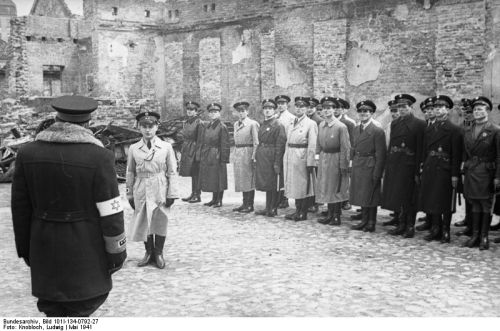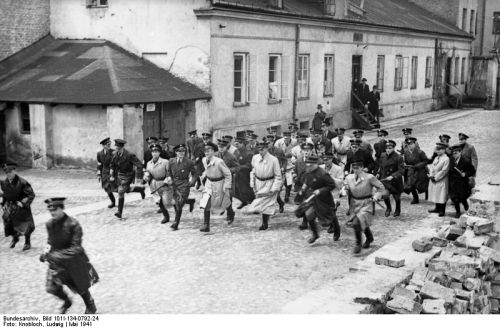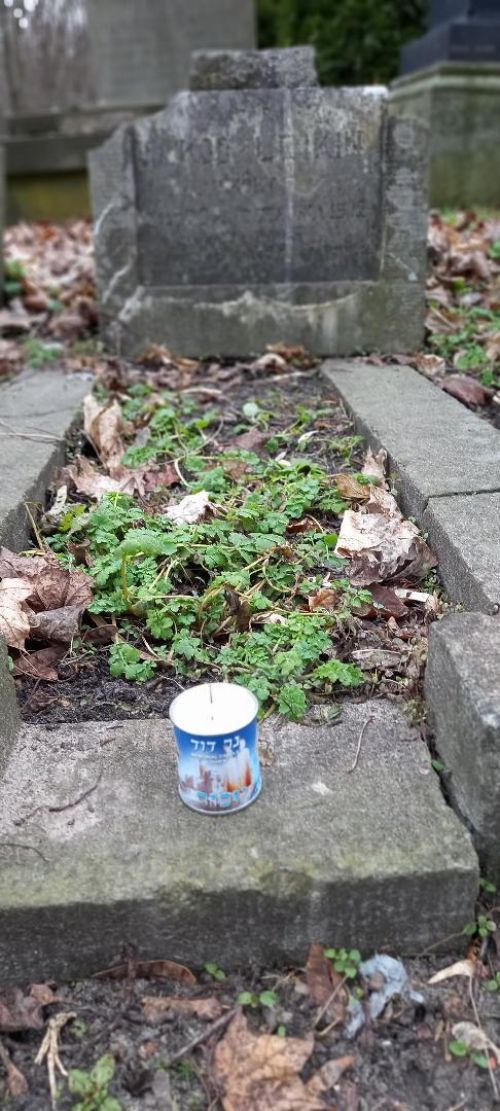Jakub Lejkin

Jakub Lejkin reports to Szerynski - Jewish Order Service Commander in the Warsaw Ghetto
Bundesarchiv - May 1941
Jakub Lejkin was born in 1906. His father was a wealthy tradesman. Lejkin graduated from the Polish military school in Jarocin. Stanislaw Adler, a member of the Judenrat, who vetted applications to join the Jewish Order Service, had this to say about Jakub Lejkin:
'The admission of Jakub Lejkin presented equal difficulties. This young lawyer was ambitious, capable, well-mannered, and indefatigably energetic, but he had not gained the respect of his colleagues, and there were rumours of shady practices during his legal career. The fact that he had allowed a former patron to hide from creditors in his own home, had not increased his colleagues esteem.
We did not, however, allow these things to influence our decision on his admission. What did contribute to his rejection was his height. I can still recall vividly the caricature-like figure of little Lejkin in his rejtuzy - jodhpurs, and his canary-yellow cardigan, the future 'Napoleon of the Order Service,' telling everybody that he had won them for taking third place in the school for military officers. Then, with tears in his eyes, he had to beg to have the rejection of his application to the Order Service reversed. His request was granted and Lejkin, who was highly favoured by Lederman, began his rapid rise in the Service hierarchy.'
The Jewish underground group ZOB condemned to death Jakub Lejkin, the first person to be thus targeted. He was the prime symbol of the Jewish policeman who dedicated himself with bizarre devotion to the deportation 'aktion.' The hatred of the police, which was a kind of collective response of the remnant population of the ghetto and was repeatedly underscored in diaries and memoirs, was first channeled against Lejkin, who was not only an obedient servant of the Germans and unhesitatingly tormented their victims, but even worked out a 'philosophy' to justify his work, thereby enabling him to contribute to paralysing the will of the Jews and the dissemination of false illusions. .

Lejkin, rear of the photo in white coat watches as Jewish Order Service springs into action (Bundesarchiv)
The assassination was planned with great care, and the group that accepted the mission consisted of three members of Ha-Shomer ha-Za'ir. Margalit Landau and Mordecai Grobas trailed Lejkin for some time, studying his habits and charting his regular movements and hours of work, while Eliyahu Rozanski was chosen as the assassin. Toward the evening on October 29, 1942, at ten minutes past six, Lejkin was shot to death while walking from the police station to his home in Gesia Street. His aide Marcelli Czaplinski, who was walking by his side, was injured. The reverberations were felt throughout the ghetto; as Ringelblum described it some time later, 'Lejkin, who had allowed power to go to his head and whose dedication to the Germans was boundless, was 'swept out' by the organisation to the heartfelt acclamation of the Jewish population.'
On the next day, October 30, handbills were posted in a number of spots in the ghetto, proclaiming that since the ZOB had announced the trial of the leaders, officers and members of the Jewish Police in Warsaw on August 17, the sentence pronounced on the deputy commander of the police, Lejkin, had been carried out. Further on the announcement stated:
We also hereby inform the population that the following have likewise been convicted:
1. The Judenrat in Warsaw and its presidium, on the grounds of having collaborated with the conqueror in signing the deportation order.
2. The managers of the 'shops' and members of the Werkschutz, due to their cruel treatment of the workers and the 'illegal' Jewish population. Retaliatory measures will be adopted in all their severity.

Warsaw Jewish Cemetery - Jakub Lejkin's Grave (Howard de Lestre)
Sources
Stanislaw Adler - In the Warsaw Ghetto, Yad Vashem, Jerusalem 1982
The Warsaw Diary of Adam Czerniakow, Elephant Paperbacks, Ivan R Dee publisher Chicago, 1999
Abraham Lewin, A Cup of Tears,Fontana Paperbacks, London 1990.
Photographs: Bundesarchi, Howard de Lestre
© Holocaust Historical Society, March 9th, 2022

